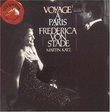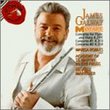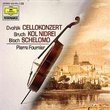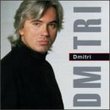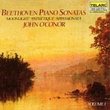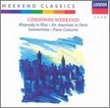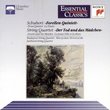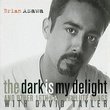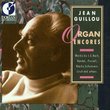| All Artists: Horst Fiehl, Werner Hahn, William Pickersgill, Franz Schreker, Michael Halasz, Erica Pilari, Marisa Altmann-Althausen, Hagen Philharmonic Orchestra, Christina Styczynski, Elena Grigorescu, Susanne Pettersson, Cornelius Sullivan, Jürgen Dittebrand, Reinhard Leisenheimer, Thomas Jr. Harper, Paul Friess Title: Franz Schreker: Der ferne Klang Members Wishing: 0 Total Copies: 0 Label: Naxos Release Date: 6/13/2000 Genre: Classical Style: Opera & Classical Vocal Number of Discs: 2 SwapaCD Credits: 2 UPC: 730099607421 |
Search - Horst Fiehl, Werner Hahn, William Pickersgill :: Franz Schreker: Der ferne Klang
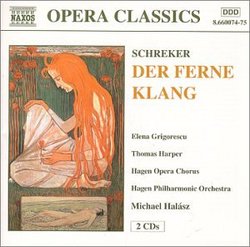 | Horst Fiehl, Werner Hahn, William Pickersgill Franz Schreker: Der ferne Klang Genre: Classical
Eclipsed by the music of the Second Viennese School, Franz Schreker's musical output is currently undergoing something of a deserved renaissance. Originally on the Marco Polo label, this opera's appearance at super-budget ... more » |
Larger Image |
CD DetailsSynopsis
Amazon.com Eclipsed by the music of the Second Viennese School, Franz Schreker's musical output is currently undergoing something of a deserved renaissance. Originally on the Marco Polo label, this opera's appearance at super-budget price is to be enthusiastically welcomed. The musical style is late Romantic, rich and pregnant with possibilities. Berg in fact prepared the vocal score for Der ferne Klang, and one can detect seeds of the vocal style of Lulu here (especially in the writing for Grete, who, like Lulu, emerges as a fallen woman). Richard Strauss's operatic vocal lines also spring to mind. More than this, Schreker's complete command of the orchestra means that atmospheres are graphically invoked. The interludes (often excerpted, such as the "Nachstück" on Sinaisky's Schreker disc emerge as much more than links between scenes. Elena Grigorescu is completely at home as Grete, her account heart-rendingly touching. Her lover, Fritz (who leaves her in pursuit of the "distant sound" of the title), is well sung, with exemplary diction by the tenor Thomas Harper, and the cast in general is first-class. Full German text is provided. --Colin Clarke Similarly Requested CDs
|
CD ReviewsScary work looks ahead to Bartok as much as back to Strauss darragh o'donoghue | 03/07/2001 (5 out of 5 stars) "Most operas deal with the creation and rupture of unions. 'Der Ferne Klang' opens with a rupture in its opening scene, and an absence, as Fritz, a playwright, leaves his fiancee Grete to seek the mysterious 'ferne klang' (distant sound) that will enable him to create great art. This is the first in a pattern of reversals of traditional opera, that sees Schreker allude to, and invert, famous 'worldly' operas - 'Die Fledermaus', 'Der Rosenkavelier', even 'Die Meistersinger', and especially 'La Traviata' - so that his work ends in union, with life-threatening disease striking the male character for once.This focus on absence gives the opera a metaphysical frisson that helps it transcend pastiche Richard Strauss. Not that this pastiche isn't expert - the exotic, late Romantic orchestral colouring; the swoops of violence and calms of lyricism; the simultaneous disintegration and affirmation of melody; the self-reflexivity (the hero-artist; the number of stage orchestras).But there is a supernatural undertow throughout, culminating in the extraordinary Act 2, a frivolous, La Traviata-style society scene breaking down into Purgatorial hysterics; or the sparse, haunting suspense of Act 3. Schreker continually brings his melodic and tonal language to the brink of febrile collapse; if, like Strauss, he pulls back, the threat/promise gives the listener palpitations. This recording is a little boxy, and the singing often sounds distant, but this somehow adds to the delicious unease of this singular opera." Forgotten Late Romantic Master and "Degenerate Artist" Christopher Forbes | Brooklyn,, NY | 01/24/2003 (4 out of 5 stars) "Franz Schreker is one of the many late romantic German and Austrian composers who became victims of the Nazi purge on "degenerate art". Schreker came in for abuse mostly because of some Jewish roots in his family and a penchant for lurid subject matter in his most famous operas. Musically, his operas are no more radical than, say, Strauss' Elektra. But whereas Strauss retreated into a sort of polite neo-classicism tinged with Wagner in his later years, Schreker stayed a basically late-romantic expressionist and this expressionist aspect doomed his music. Die Ferne Klang is perhaps Schreker's finest opera. The plot involves an artist who abandons his fiance to go in search of "the distant sound" which will allow him to produce the perfect work of art. As the opera progresses, the main character, Fritz, leads a life of gradually increasing desolation and finally death. Of course, on his death bed he finally hears Die Ferne Klange. The score is in fine expressionist mode, though basically tonal. Schreker was one of the most brilliant orchestrators of the early 20th century and his orchestral palette obviously had an influence on Berg's Lulu. Though the music remains late-romantic in idiom, Schreker lives on the edge of tonality most of the time, sometimes loosing the sense of key center for long stretches, particularly as the main character's life falls more and more apart. Vocal the writing is difficult, though not completely unmelodic. It is rather akin to the vocal writing of Wagner in his most "sturm and drang" mode. There are moments of lovely melodic writing though. Perhaps not as lovely as Strauss, but close. The performance on this disc is serviceable, though I prefer the older Cappricio disc, both in terms of sound and singers. Unfortunately, the Capriccio disc is now out of print, but this makes a good substitute, if not spectacular. We have yet to get a spectacular recording of this fine opera. Perhaps it's waiting for a more adventurous European company to rediscover it. It's definately worth reviving." Magnificent Music Missing Melody Gary L. Jacobson | Beaverton, OR USA | 08/30/2000 (3 out of 5 stars) "Der Ferne Klang is my second exposure to the music of Franz Schreker, the first being his Chamber Symphony. My libretto is German only and since I do not know this language I was unable to appreciate the interplay of text and music. I loved the different orchestrations achieved by this composer. He gets a great deal from the various instruments, at times simply wonderous orchestral coloration. There were moments during the opera (I have now heard it twice) when it seemed as if it were an exercise (and a mighty good one at that) for a master class in orchestration. Yet, when it is over, nothing remains for me except this amorphous annal of arresting music. I think I am rather like Fritz, searching for a sound - in my case - a memorable melody. Alas, I did not find one."
|

 Track Listings (18) - Disc #1
Track Listings (18) - Disc #1